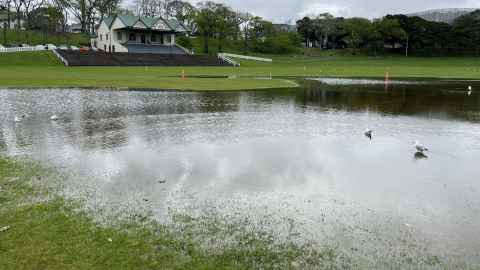Big players dropping the ball on climate change
5 November 2025
New Zealand’s major sports bodies are lagging behind much of the world when it comes to climate action, says University of Auckland sociologist Dr Chris McMillan.

University of Auckland sociologist Dr Chris McMillan says Aotearoa’s big sports organisations are not winning any races when it comes to climate action.
“We like to regard ourselves as punching above our weight in the sporting arena, but when it comes to environmental sustainability from sports organisations in Aotearoa, we’re barely off the starting blocks ,” says McMillan, who teaches social science and works with the University’s Centre for Climate, Biodiversity and Society - Ngā Ara Whetū.
Of the 278 signatories to the United Nations Sport for Climate Action Framework, which commits sports organisations to halving their greenhouse gas emissions by 2030 and achieving net zero by 2040, only two are from New Zealand – the Black Foils Sail GP team and University and Tertiary Sport New Zealand, he says.
“Few New Zealand sporting organisations have developed a formal environmental sustainability plan,” says McMillan.
Sport New Zealand has produced reports which talk about climate change being a major threat to the future of sport in this country. However, it has yet to set out a comprehensive strategy for the sector, he says.
The lack of action to improve sustainability comes despite climate change having a significant impact on sports in New Zealand, says McMillan.
Games are frequently disrupted or postponed due to cyclones, heavy rain or extreme heat. Many clubs are facing higher costs to maintain facilities in the face of floods and droughts.
“Sport is one of those ways in which we meet climate change most directly, like when you want to go skiing, but there's no snow.
“People often talk about climate deadlock, where we can acknowledge that climate change is getting worse, we can see the effects coming, yet we continue as if we don't. And that's what's happening with sport at the moment.”
Most sports organisations have focused on adapting to the climate crisis, by changing the timing of games, having more breaks, or building more climate-resilient facilities, rather taking action to minimise their impact, says McMillan.
“Obviously, we need to adapt to the changing climate, but if climate change continues to get worse, then we'll be forever adapting. Yet we seem to be in denial of the need to make transformative changes.”

While some organisations are doing great work reducing waste and installing more sustainable energy systems, commercial sport isn’t facing the biggest problems, says McMillan.
Flights are typically the largest source of greenhouse gas emissions for major sports, while building new venues takes the second highest environmental toll.
Capitalist models of perpetual growth are at the core of the problem, with major sports operating as businesses that are reluctant to consider reducing profits in the short-term to win the long-term goal of reducing climate change costs, he says.
Looking to the past could help guide the way to a more sustainable future, says the 42-year-old.
“We think what we have now is inevitable, that sport must always continue growing - we must always play more matches, we must always travel. But even 20 or 30 years ago that wasn't the case and being able to rethink what might be possible is a vital step here.”
McMillan’s passion for cricket opened his eyes to the impacts of sport on the climate and vice versa.
“Ever since I was seven or eight, sport has been at the centre of my universe. Cricket is my absolute obsession.
“I would love my 6-year-old twins to be more involved in sport, but with climate change you wonder what their future is going to be like. Are they going to be able to use sports facilities? Are they going to be able to play outside or are they going to be stuck indoors, playing video games, because it’s too hot to go for a bike ride?
“That's quite a scary thing for me.
“Part of what motivates my work is trying to get us to confront those really difficult questions about what kind of future we will have if we don't radically change the way we think about sport and the way we think about the organisation of our society in general,” he says.
Media contact
Rose Davis | Research communications adviser
M: 027 568 2715
E: rose.davis@auckland.ac.nz